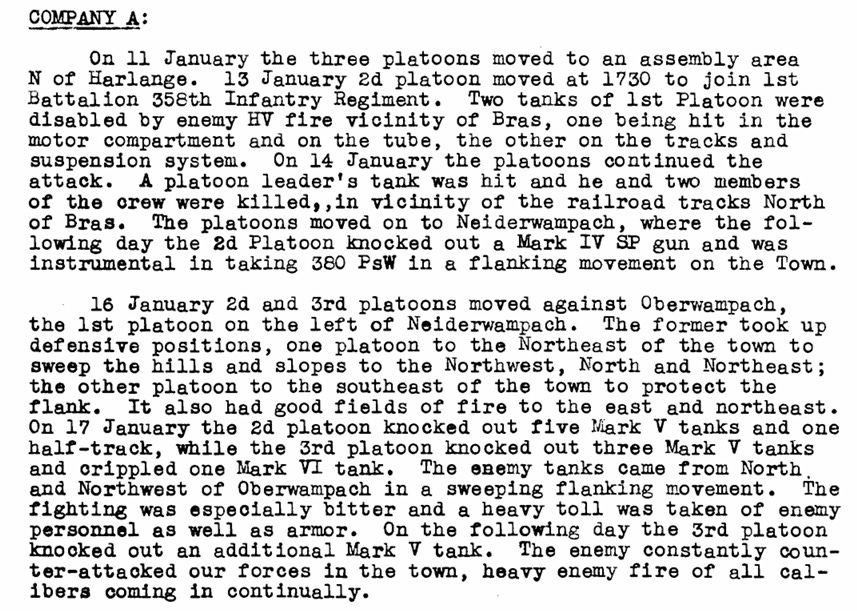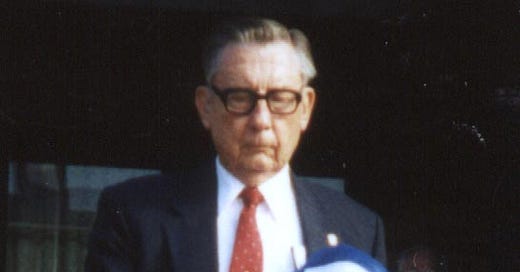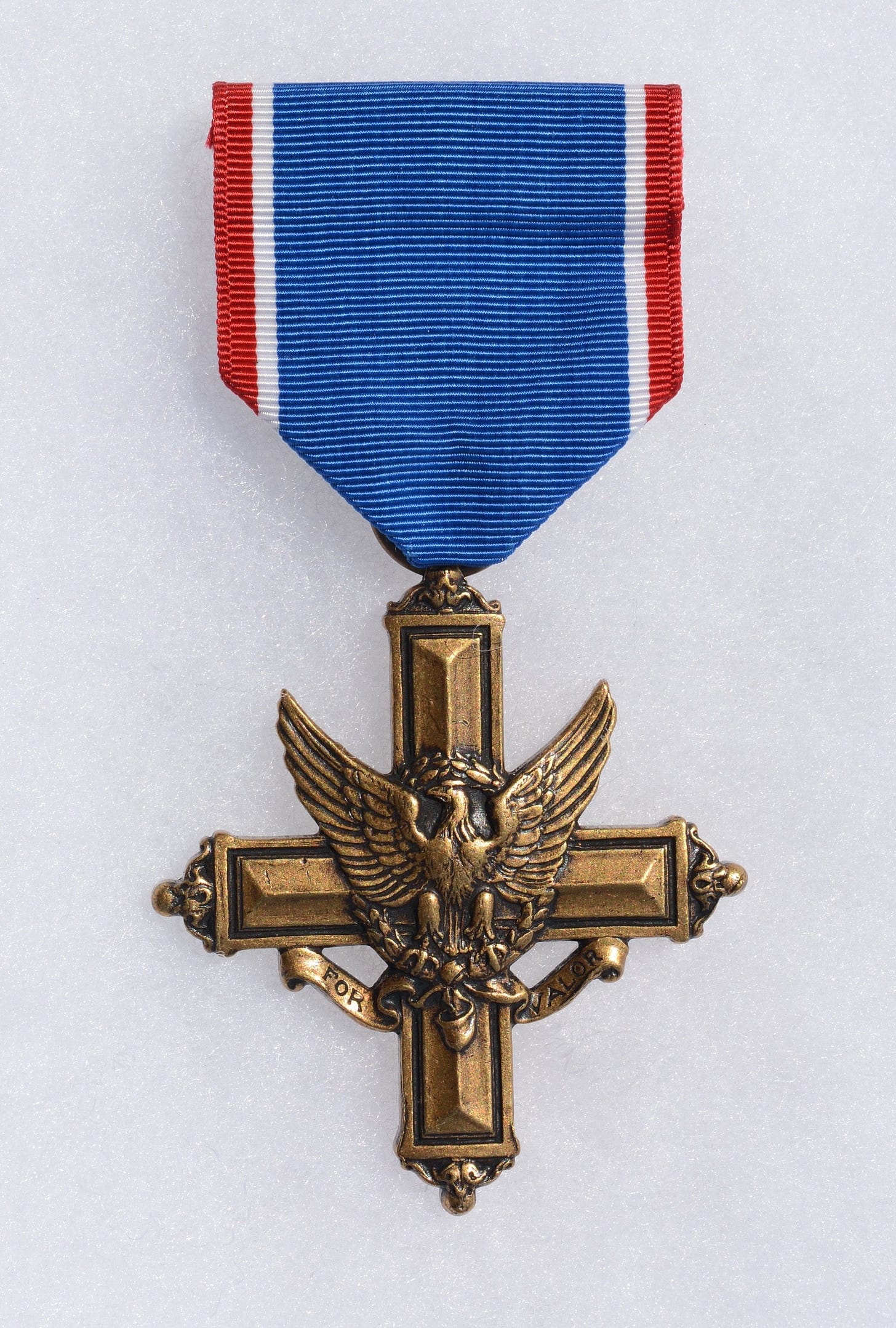When I was writing the first edition of Tanks for the Memories, I sent a draft to Lester O’Riley, the 712th Tank Battalion Association president, to get his opinion. Among other things, he persuaded me to eliminate the chapter on Colonel Whitside Miller, the battalion’s buffoon of an original commanding officer, because Colonel Whitside’s widow was still alive; although I included it in the second edition because she had since passed away. But in the letter he commented on the nature of decorations.
30 May, 1993
Dear Aaron,
I have read your draft manuscript several times since it arrived and each time I go through the stories I plan to write. Each time something happens and I later scrap my efforts. Hopefully, this will make the mail.
I’m beginning a draft of the next newsletter, or more accurately, I’m about to write from my notes what was lost this weekend in the word processor. Those things happen, particularly when you have grandchildren who are computer wise for playing games but don’t understand what the “Save” means when it gets on the screen.
I have had many thoughts about these stories, and my mail brings me copies of several newsletters from other organizations; some of them have a corner for short stories of actions by members of WWII units. Some recount stories of events which were very much in disobedience of regulations and are much more appealing for that purpose. I remember a standard comment of the “Rainbow Division,” which sent out a six-man detail; two shooting-two looting and two painting them damned rainbows on everything. I remember in Dillingen, Germany, when we had crossed the Saar River and were fighting to hold our part of town, a couple of 90th Division men had set up their machine gun alongside a building at a place on the sidewalk where a grill covered the vent to basement windows. While one watched down the street, the other was typing a letter on a typewriter he had “borrowed” from the building.
The Army was full of characters like those pictured by Bill Mauldin’s “Willie & Joe.” I’m sure we all did our best to rebel against the system just enough to register our resentment.
All these stories make good reading, for they bring back to us so many incidents which were ridiculous enough to be good therapy for the tensions of war. Only when you’re bereft of a sense of humor and certainly when you can't laugh at your mistakes, are you nearing the breaking point. And heroes are those who are just compelled by their obsessive nature to do the damned fool things they’d never do if they had time to consider the possible outcomes.
Speaking of “heroes” — every GI in WWII that served in the 712th had at some time an opportunity to do something which was a bit more than that required by “normal duty.” As we used to say, “That ain’t within my M.O.S. (job description).” This laughingly was our response to doing things that tankers aren't supposed to do.
Valorous action became so commonplace that we all knew that three things were necessary for an award for bravery. 1) the opportunity to do something beyond the normal call of duty, 2) somebody to see you do it and report your actions, 3) somebody at headquarters who could “write it up.” Sadly, the third thing was not always available. Often the second thing was lost when witnesses became casualties.
Some men were embarrassed by being given a citation for some action when they could point out others who had done more heroic things and had done them often. In the same vein of thought, it’s degrading to the system to be cited for bravery for an action which in your own opinion was far less dangerous and far less demanding of you personally than other actions which went unnoticed, unreported and unrewarded. So many of these things will never be told by the men because they personally feel that this be a lot of unjustified bragging.
One of our recent losses used to get together with me at reunions and other times and we’d laugh about his guard duty in Normandy when a noise in front of his outpost raised thoughts of a German patrol, and he blasted a herd of grazing sheep. The evidence was there at daylight. The patrol was reported and went into the log book. He didn’t want to be remembered for that action. Neither did his company exec who reported the patrol. And that’s my war story.
Thanks for the manuscript,
Les
Which brings me to Ted Davis. a private first class and the only enlisted man in the battalion to be awarded the Distinguished Service Cross. There is no description in the battalion’s after action reports of Davis’ action other than it likely involved one of multiple German counterattacks in the vicinity of Oberwampach during the Battle of the Bulge.
Despite the disconnect between the DSC citation and an account by Forrest Dixon, who was not present but was involved in discussions of the award and possibly the decision to abandon either the tank or the platoon of tanks in a mine field, there is no question that Davis’ actions were heroic. After hearing Dixon’s account of the event, I was unable to get a firsthand account from other veterans of A Company that I interviewed, which is somewhat understandable as Davis was alone when the action took place.
I first heard of the incident at the 1993 battalion mini-reunion in Bradenton, Florida, during a discussion that included Ellsworth Howard and Forrest Dixon.
“Do you remember,” Howard asked Dixon, “that tank we found sitting up there [during the Battle of the Bulge], perfectly good tank and nobody in it, nobody around it? We didn’t know what the heck the deal was. We got in that thing, I drove it back and you were the tank commander. We took that thing back, and I never did know whose tank that was.”
“I do remember one of those tanks that we lost in a mine field,” Dixon said. “One of the tanks where this Private Davis got a Distinguished Service Cross. The 10th Armored, they’re gonna steal a tank. So they went in there and had a man killed. And we got a little nasty letter, why did we abandon tanks? It didn’t take us long to answer that one. By god, we didn’t abandon tanks. We marked the field mined, and I said the 10th Armored was trying to steal a tank from us. And that was the end of that.”
“Who was Private Davis?” I asked.
“You know, I tell this story and I don’t know who he was, but he got a DSC,” Dixon said. “He was about the same type of kid as the one they shot, what was his name? The one that Eisenhower or they tried, Detroit boy, Slovik. [Eddie Slovik was the only American soldier executed for desertion during World War 2, and the comparison is a bit unfair in that, as best I can gather, apparently Davis only disobeyed an order to abandon tank while the rest of the crews evacuated when his platoon was in a mine field]. This Davis was just an exact copy of him. And we lost this platoon in this mine field. And we got the engineers and they evacuated all the crews, but Davis wouldn’t leave. ‘Oh, god, I ain’t gonna leave, I might get hurt.’ So I said, ‘Well hell, stay there. We could care less.’ So this was probably ten, eleven o’clock in the morning. [Apparently, Dixon, as the maintenance officer, was involved in the decision to abandon the tanks in the mine field.]
“Well, I don’t know the whole particulars, but then along the middle of the afternoon, here comes the Germans. And here’s Davis in this tank, and he sees them coming. And all he knew how to shoot was the bow gun [The .30 caliber machine gun that was operated by the assistant driver]. And he melted the damn barrel he shot it so much, but anyway, he kept the Germans back.
“Of course the infantry thought he was the greatest. But then, he didn’t know how to operate any of the other guns. So he crawled out and climbed into another tank. Here comes the Germans, in about another hour. And he burns up another gun. He done this three times. And the infantry insisted that he be sent in for a Congressional Medal of Honor. And Colonel Randolph [this would have been Colonel Vladimir Kedrosky, as Colonel Randolph had been killed the week before] says, “No way.” I think he said something to the effect that in a normal army he’d have been shot. But he did agree to send him in for a DSC.”
And this is Davis’ Distinguished Service Cross citation:
DAVIS, TED R.
Citation:
The President of the United States takes pleasure in presenting the Distinguished Service Cross to Ted R. Davis (6583031), Private First Class, U.S. Army, for extraordinary heroism in connection with military operations against an armed enemy while serving with Company A, 712th Tank Battalion, attached to the 90th Infantry Division, in action against enemy forces on 17 January 1945 in Luxembourg. During a determined enemy attack near Oberwampach, Luxembourg, the tank in which Private First Class Davis served as a cannoneer and leader [loader], was set on fire by two direct artillery hits, forcing the crew to take cover. When the tank ceased to burn, Private First Class Davis voluntarily made his way through withering fire to the vehicle, mounted it and repaired the damaged guns. When the enemy advanced to within machine gun range he opened fire, decimating their ranks and forcing them to withdraw. Later he assembled a crew and drove the tank into action which resulted in the destruction of an enemy tank. Private First Class Davis' fearless determination, personal bravery and zealous devotion to duty exemplify the highest traditions of the military forces of the United States and reflect great credit upon himself, the 90th Infantry Division, and the United States Army.
Headquarters, Third U.S. Army, General Orders No. 74 (April 7, 1945)
Home Town: Santa Barbara, California
And this is the after action report for the time period (January 17, 1945) that this took place.
I’m not even sure which platoon Davis was in — one veteran, tank driver Bob Anderson, said Davis was in the third platoon — and there is no description of his heroics in the battalion’s after-action reports.

At the 1995 battalion reunion in Louisville, Kentucky, I asked about Ted Davis during a conversation with some A Company veterans including Clarence Steuck, whom I hadn’t met previously, and Neal Vaughn, who regularly attended the reunions.
“Do you remember Ted Davis?” I asked Steuck.
“Wasn’t he … he was … sure, he got the Distinguished Service Cross,” Steuck said. “I was with him after the war [in Amberg, Germany, where the battalion was stationed after the end of the war in Europe]. He was the stable sergeant, and that’s where I know Ted Davis. He was kind of unorthodox. He was from California. He did his own thing, when he wanted to do it. He rode, if you remember, we had a real wild, the horse had eyes, white, wilder than heck, and Ted used to get drunk and ride her just for the fun of it. He would never be on top. He would be hanging underneath, going through Area 13 that was nothing but shell holes, and here he goes. Yeah, he was wild. He wasn’t an orthodox guy. He wouldn’t talk much, though. He just, you had to go up to him like a wild stallion. He maybe was good and maybe he wasn’t.”
“Do you know anything about the circumstances that he got the Distinguished Service Cross?” I asked.
“That was before I joined,” Steuck said. “I heard about it.”
“What I heard that,” Neal Vaughn said, “well, it was in the Battle of the Bulge when the tank got knocked out, or they thought it did, completely. I guess it was disabled. And the tank commander told them to abandon the tank. Well, he stayed, and he fired the gun by himself. And I think he may have knocked out a German tank or two. On his own. And I think that’s what it all pertained to.”
“I heard the story that he crawled from one tank to another tank,” Steuck said, “and that made it look like both of them were okay. Now that story, take it for what it’s worth.”
“Did he tell you that, or did you hear it from somebody else?” I asked.
“From somebody else,” Steuck said. “Boy, he wouldn’t tell you that.”
“What was his capacity? What did he do?” Pete Borsenik, an A Company mechanic, asked.
“I think he was a loader,” Vaughn said.
“When I knew him, he was Sergeant Davis,” Steuck said. “He was in charge of the stable, and we rode horses a lot.”
So there you have it. Some historians pooh-pooh oral history and would no doubt take the citation as gospel, unaware that it likely was written up by an infantry officer with little or no input from the tank commander who ordered Ted Davis to abandon tank. The fact that the action is apparently ignored in the after action reports lends some credence to the spoken accounts. But in all probability, the truth of what happened lies somewhere in between.





